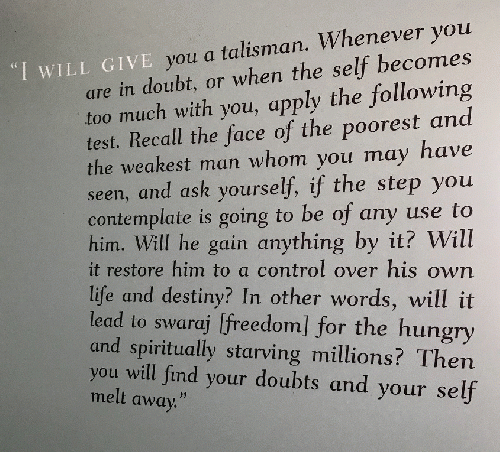Dr Ian Hodgson, CNS (Citizen News Service)

Mahatma Gandhi's Talisman to keep us on track for a just social order for everyone
(Image by CNS (Citizen News Service)) Details DMCA
(CNS): The increasing repression of civil society was a major theme that emerged during the recently concluded 22nd International AIDS Conference (AIDS 2018) in Amsterdam. A range of presentations and discussions confirmed that, in many countries, like Hungary, Russia, Venezuela, and the Philippines, the civil-society space for HIV prevention is diminishing with the introduction of new laws and policies that are aimed at minimising access to human rights and jeopardising the health and well-being of key populations.
Right wingers jeopardise harm-reduction services
Participants at one such important discussion shared many examples of human-rights violations and the challenges that civil society is facing around the world. According to Jonathan Cohen, Director of the Public Health Programme at Open Society Foundations, right-wing politicians are looking for ways to close down NGOs.
Peter Sarosi, Executive Director of the Rights Reporter Foundation (a non-profit organisation founded by Hungarian activists to advocate for the human rights of vulnerable populations), shared details of the many ways in which the Hungary government is constraining the work of NGOs because they are simply non-governmental - which means they are outside of government control - and openly criticise government policies, especially those around harm reduction. Hungary's 'war on drugs' has led to the closure of major needle-exchange programmes (NEPs), and NGOs working directly, or indirectly on harm reduction, have attracted increasing harassment from the government.
In Russia, harm reduction is not supported at the federal level, and similar to Hungary, NGOs with external funding require registration to function. The result is that NGOs are being closed down en masse. Ivan Varentsov of the Eurasian Harm Reduction Association shared that there are unscheduled audits and inspections of AIDS service NGOs to find any slightest excuse for taking punitive action against them. Meanwhile, in the Philippines, President Duterte's notorious clamp-down on drug users and drug pushers led to 1.3 million arrests and thousands of deaths during incarceration. The rapid weakening of effective harm-reduction services has led to an explosive HIV epidemic, felt activist Jonas Bagas of the Asia Pacific Council of AIDS Service Organisations (APCASO). The government has been energetic in stigmatizing civil society, and "everyone is now suspicious of NGOs," he said.
In Venezuela, difficulties relate to treatment access. According to Alberto Nieves, a founding member of the Latin American Network of PLHIV, there is a 'complex humanitarian emergency' threatening the rights and health of not only the PLHIV, but of others too, for whom access to health is jeopardized. Recent political changes in Venezuela have led to significant centralization of power in the government's executive branch, away from the judicial and legislative branches and, more seriously perhaps, away from the citizens. One outcome has been the current national-information campaign against human-rights activists seeking rights to health--not just for PLHIV but also those with cancer, diabetes, and haemophilia.
Civil society response to human-rights atrocities
(Note: You can view every article as one long page if you sign up as an Advocate Member, or higher).





